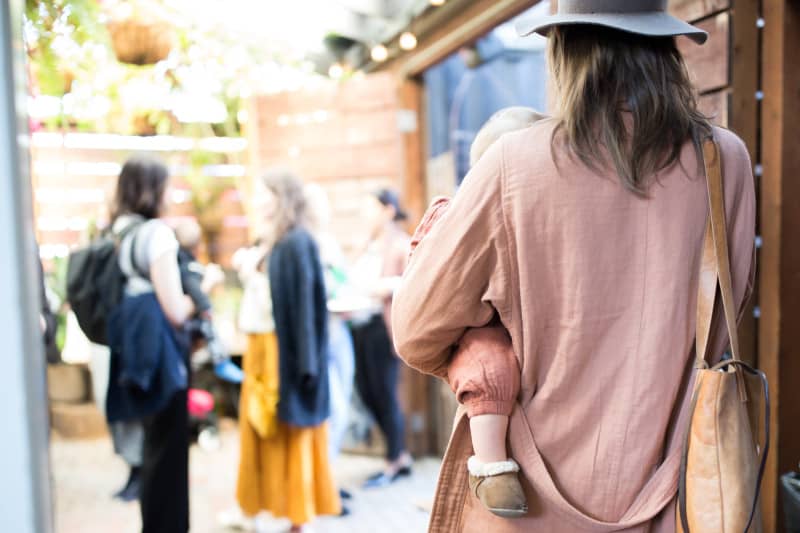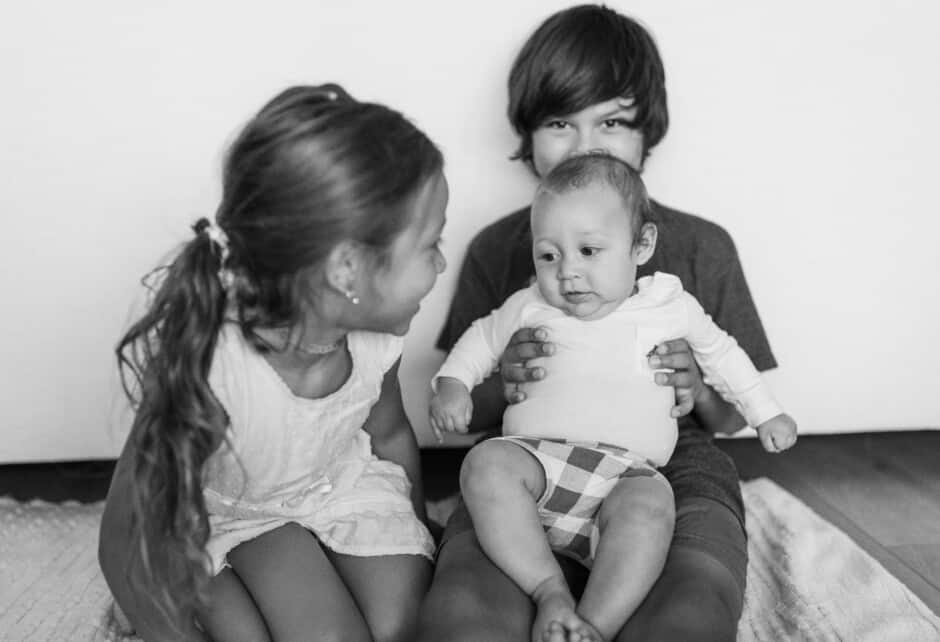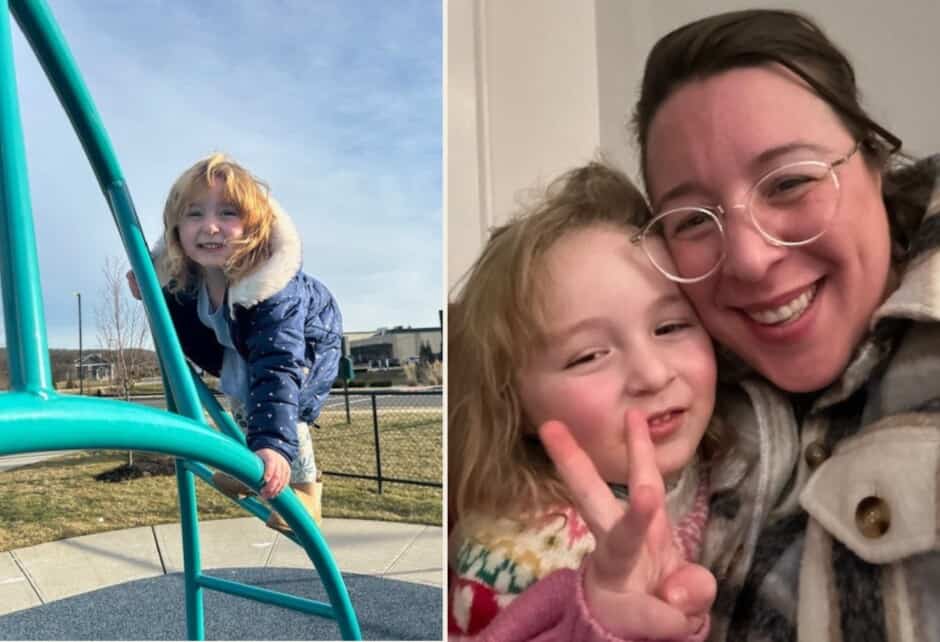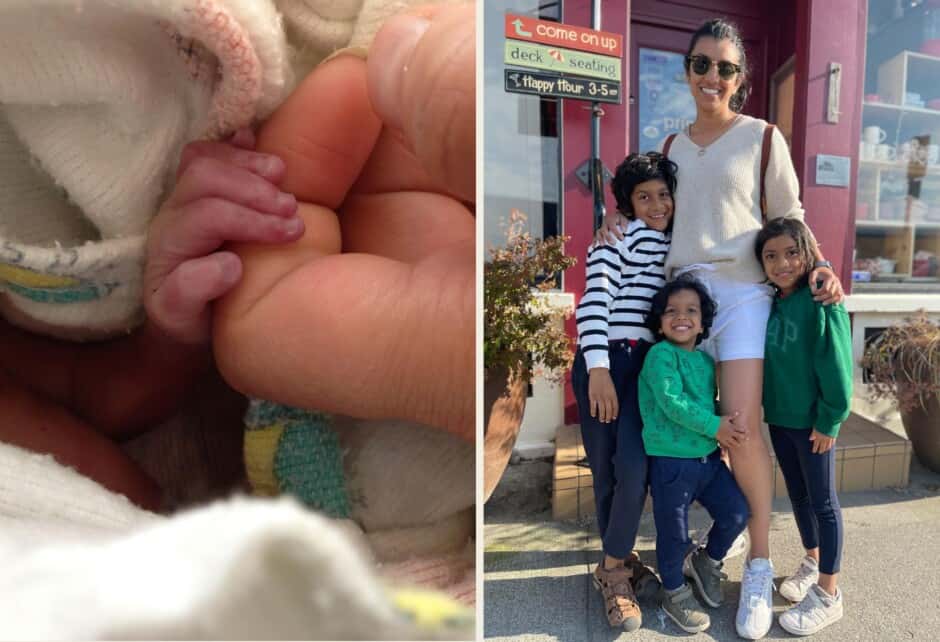
Mom Talk: From Mom Friends To Real Friends
Written by
Photography by
The concept of mom friends has both skeptics (What’s wrong with my old, non-mom friends?) and devout adherents (I couldn’t have made it through new motherhood without them!). In today’s Mom Talk, Anne Zimmerman explores the nuances of the mom friend relationship, and tells a very personal story about the evolution of her own. Anne is the author of An Extravagant Hunger: The Passionate Years of M.F.K. Fisher, and is currently at work on a memoir about her fraught relationship with her mother-in-law. She teaches in Stanford University’s Continuing Studies Program and lives in San Francisco with her two small children.
There are two kinds of women: those who share their secrets and those who don’t. I don’t. On Instagram late at night, I marvel at what the other mothers say. There are posts about breast cancer scares, dead fathers, dreams of infidelity, divorce. There is advice on sleep training, potty training, picky eating, and discipline. My fingers hover over a photo of my own darling children. What should I write? There is so much I want to say, but I can’t. Or I won’t? I delete the photo before I post it, and keep scrolling.
What is a “mom friend?” The internet defines it as the friend who takes care of you in a motherly way, cleaning up your puke if you drink too much at a party one night, or reminding everyone to pack a jacket because it might be cold after the sun goes down. To me, and to the women I know, a mom friend is something very different: She is a woman you might not be friends with if you didn’t have children the same age. She is the friend who knows only one of your identities: Mother. And when she hears you talk about the others (writer, traveler, thrill-chaser, professional) she looks at you quizzically, as if to say, I have a hard time imagining that. She has a hard time imagining you as a real person because you’ve never discussed anything more interesting than lunchboxes. And even that conversation was interrupted by the quest for a missing Hatchimal.
Fran and I were “mom friends.” We were introduced when our daughters were less than a month old. On our first coffee date, I marveled at the fact that Fran had already returned to yoga class leaving baby Nell with her husband, a bottle, and no concerns that her newborn would wither in the ninety minutes she was away. She really has her shit together, I thought enviously. I watched her strap her baby to her chest with an elaborate piece of stretchy fabric and start for home while I stayed in the coffeeshop to pack up my baby, car seat, stroller, and overflowing tote bag. At the time, I wasn’t sure I’d ever see her again.
But here’s the thing about early motherhood: you need friends and you need them to be in exactly the same phase that you are in. Before I had babies, my friend Helena told me that she used to go on walks with her newborn in Golden Gate Park, trolling for other first time mothers. She’d strike up conversations with women who seemed to have babies of a similar age; if it turned out they had older children, she’d move on. “I’m not interested in second time moms,” she said briskly. “They know too much.”
When I was in second grade I came home from school, walked to my child-sized table, put my head down and began to cry. When my mother found me and asked me what was wrong, I told her about Lisa Miller, who had announced after school that she had decided to be best friends with someone else. My mother crouched down next to me. Her dark head was next to mine and her eyes peered into the cave I’d created with my body. This is what she said: Never, ever let them see you cry.
What do second-time mothers know that first-time mothers don’t? That you will never be able to control your kid. That the oft-quoted saying is true: The days are long and the years are short. But the nights. The nights are the longest. My mom reads the mommy-blogs and follows the authors on Instagram. Did you see Oh Happy Life’s post? She’ll text me. Wow! She is never explicitly judgmental, but I know even before I have found the post that whatever the author has shared is, in my mother’s opinion, unbecoming. My mother believes in a vintage version of motherhood, one flavored by patience, optimism, and joy. It’s not just: Never Let Them See You Cry. It’s: Don’t Cry. My mother is the reason I don’t post on Instagram unless I have a cute visual and something entirely cheerful to say.
I didn’t understand the importance of “mom friends” until I had my own child, and then I did. There was solidarity and security in having a friend who was also emerging from the cocoon that is pregnancy and childbirth. Fran and I grew close, texting extensively at odd hours about breastfeeding and co-sleeping. Once a week, we’d meet mid-morning for a walk and a strong cup of coffee. A couple of years later she had another daughter, and then a third. I had a son. We saw each other less. Occasionally we went to the park or the farmers market or our families shared an early dinner. By this point, we had begun talking about things that weren’t directly related to the logistics of mothering young people, like shoes and fancy face scrub. Once I sent her an essay about art and mothering from The Paris Review. She sent me an article about female rage from The New York Times. We connected intellectually, but ironically, I didn’t even know where she’d gone to college. Not once did Fran and I go anywhere alone. We never went out for a drink or shared a meal or went anywhere without at least two small children in tow. We were mom friends.
But then, my miscarriage. I told her not because I wanted to share my sadness, but because I was afraid she’d embarrass me. Fran is bold; an extrovert who knows somebody everywhere she goes. She knew we wanted a third baby and guessed I’d get pregnant quickly. After the miscarriage, I knew that if she asked me about our efforts in public, I’d burst into tears.
To save us both the shame, I texted her the Monday after I started bleeding heavily with a casual, “Hey, how’s it going? So, you didn’t know I was pregnant, but I guess I had a miscarriage?” I ended the sentence with a question mark, even though I was certain of my pregnancy’s demise. Since I didn’t want anyone to know about our loss—not my parents, not my longtime girlfriends—I considered my text a perfunctory FYI, not a confession. But then, she replied. “Oh babe. How are you?” I told her how I’d felt lightheaded and started bleeding in a BBQ joint in Dallas. How after lunch, my husband had driven our rental car through the stately neighborhoods of the city, stopping frequently so I could use the bathroom. While our kids slept in the back we debated if it was too risky for me to fly home. I told her how later that night, when we finally arrived in San Francisco and put the kids to bed, a translucent pink amniotic sac had plopped out of me and into the toilet. How I’d been so sad and yet so happy. I hadn’t left my ‘baby’ in Texas. Each time she responded, I told her more. Each message a needle with blood red thread, stitching us closer together. My secrets becoming hers.
A few days after I told Fran about my miscarriage, I told my college girlfriends, the women I’d been friends with for decades, my real friends. “Wow,” one responded when she heard the news, “I don’t really know what to do with this information.” As if I did? Next I told my mother, who rationalized that miscarriage was something that was hard to make sense of, but that it was “probably for the best.” I had been abandoned.
It helped that Fran was a social worker. Professionally, she knew what to say. But it also helped that she wasn’t afraid of my raw emotions or worried over the fact that she might not know quite what to say. “Holding space,” the shrinks and yogis like to call it—a term that always seemed rife with a pretentious mix of psychology and hippie magic until it was applied to me.
I was folding a pile of child-sized laundry when a text from her arrived: “What are you doing for lunch?” “PB & Jelly crusts? Bunny crackers?” I typed back, punctuating my message with an embarrassed looking emoji and a “Ha Ha.” I was trying to act like everything was normal, but we both knew it wasn’t. Ten minutes later, another message: “Answer the door. Lunch is on the way. Don’t tip.” And before I could respond, another: “You need to take care of yourself.”
It turned out that I needed someone to know my secret. And I needed a friend, a mom friend. Not a woman with a child the same age as mine, but a woman to mother me in the way that no one else close to me could, or would. The result of pretending like my brief pregnancy didn’t happen was feeling like it actually did not happen. A baby made invisible: the worst kind of loss. If a tree falls in the forest and no one hears it, does it make a sound? But there, with Fran, was the proof: a novella of life and death transcribed over text message. And us, finally, real friends.
Are you a mother with something to say? Send us an email to be considered for our “Mom Talk” column.
Share this story



